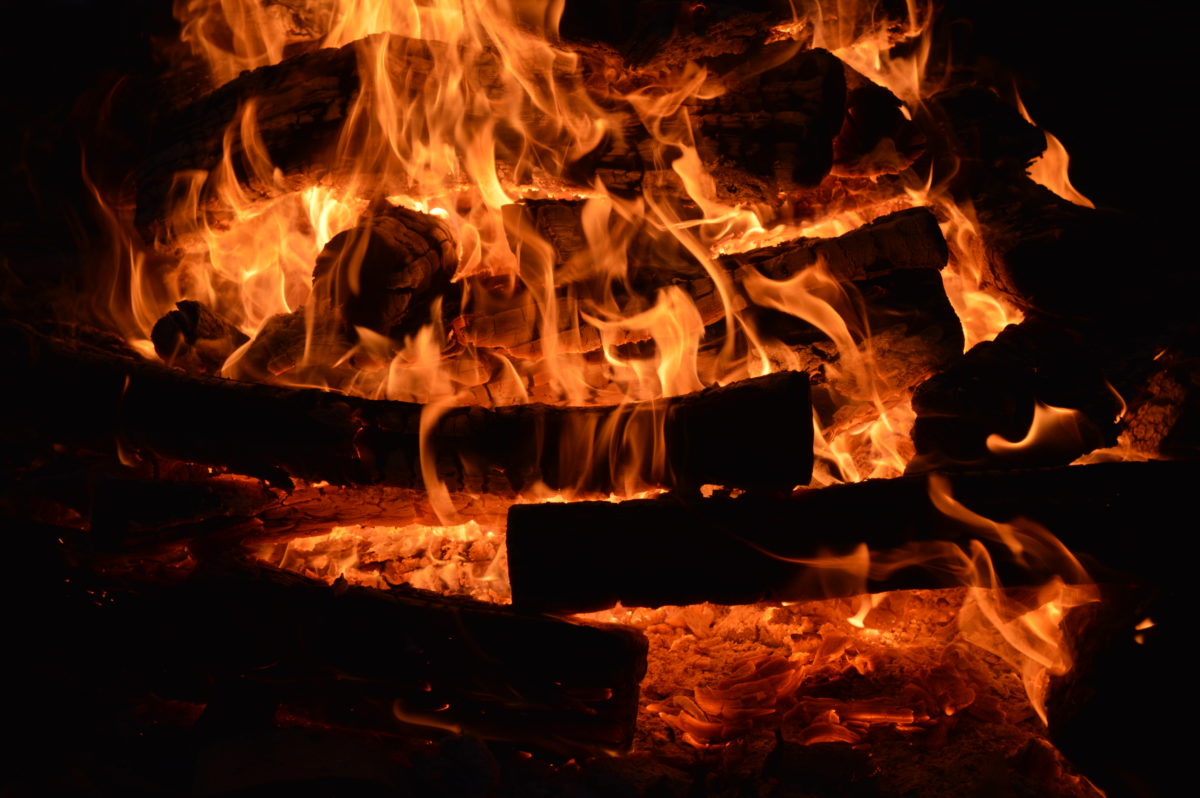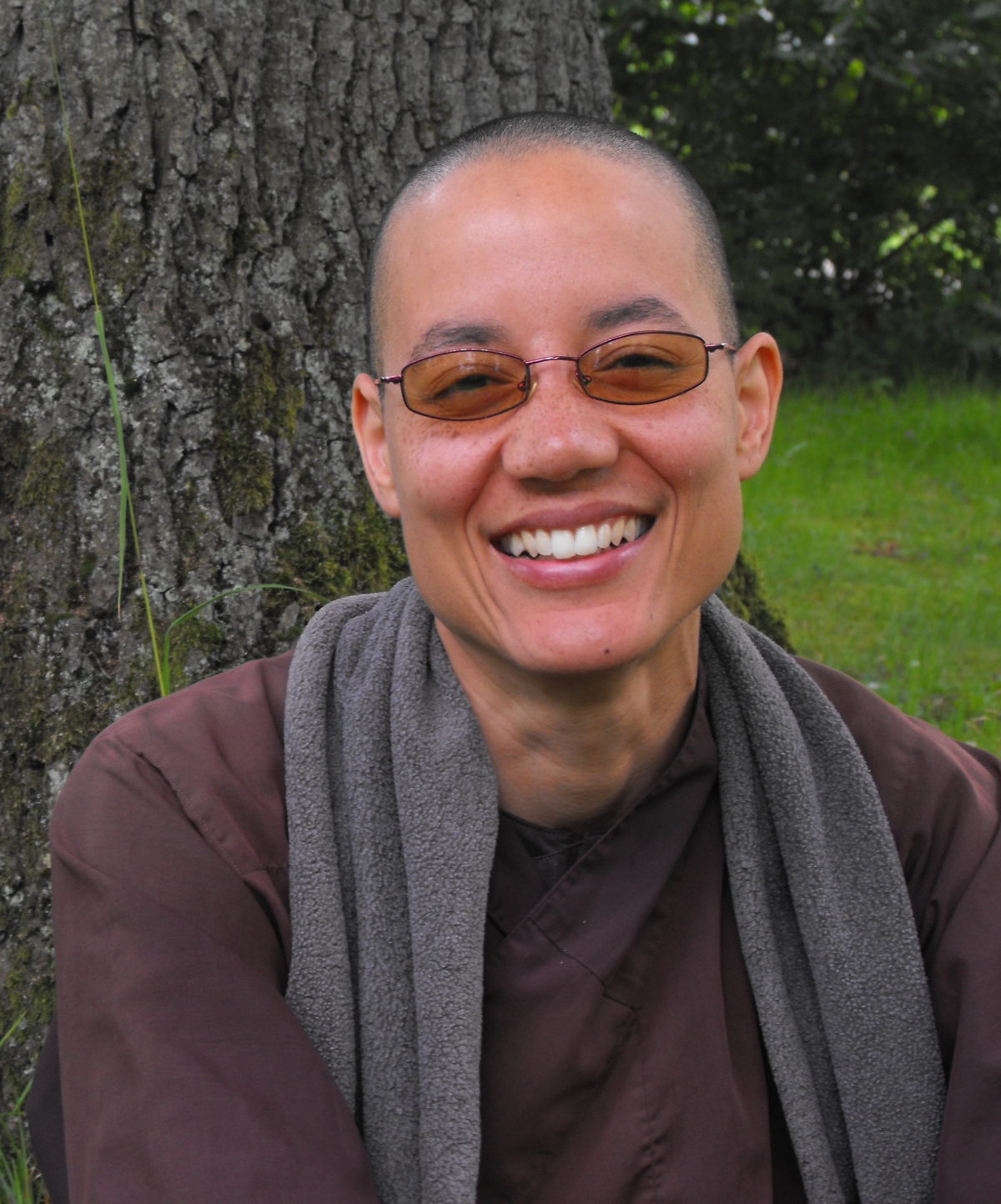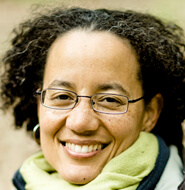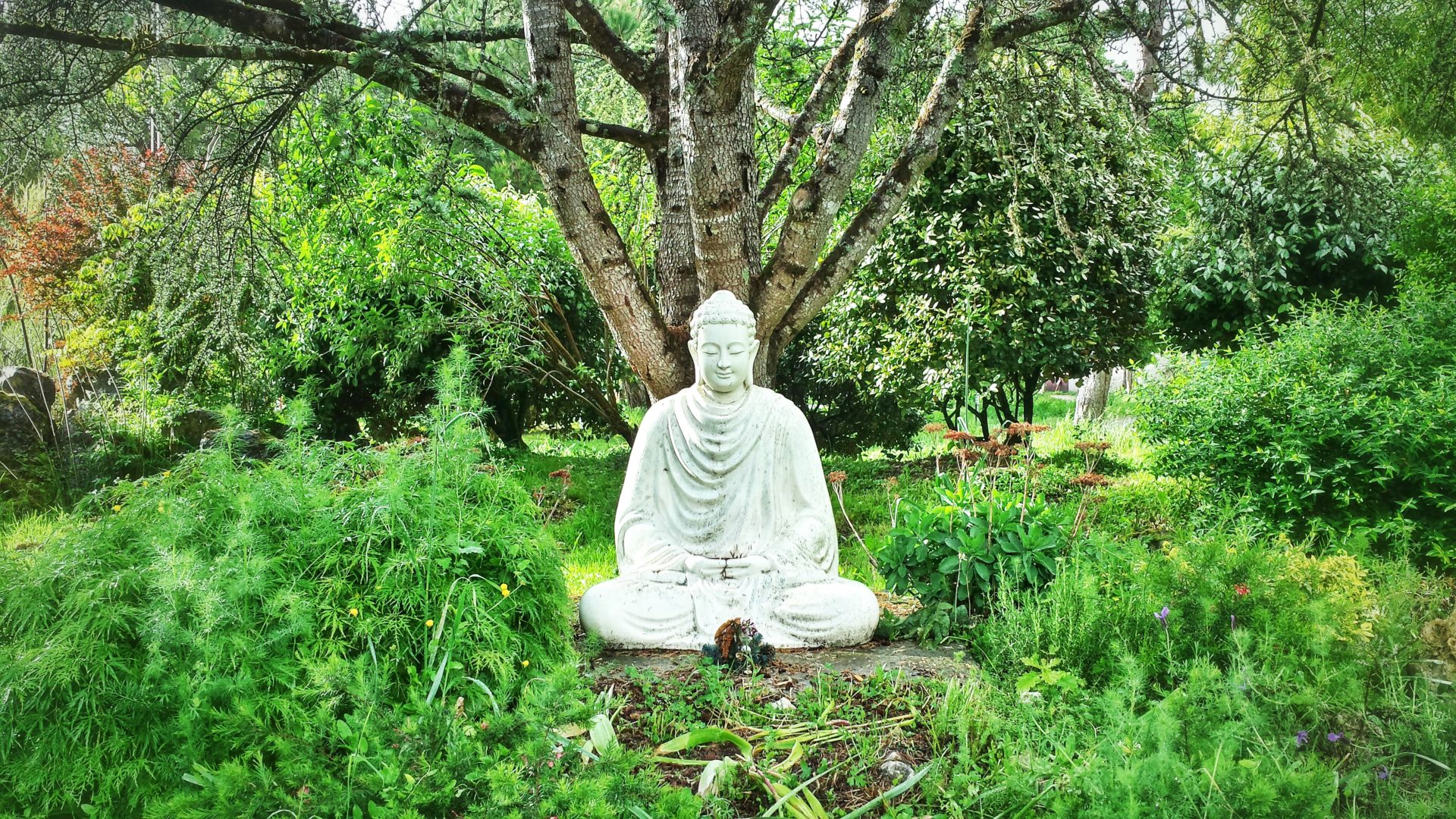By Kaira Jewel Lingo in October 2014
Let us look at the four nutriments, the four kinds of food that the Buddha talked about in light of what can help us see our connection with all things. The Buddha taught that the first nutriment is edible food, the food we eat with our mouth. The second is sense impressions, what we take in through our eyes as images,
By Kaira Jewel Lingo in October 2014
Let us look at the four nutriments, the four kinds of food that the Buddha talked about in light of what can help us see our connection with all things. The Buddha taught that the first nutriment is edible food, the food we eat with our mouth. The second is sense impressions, what we take in through our eyes as images, our ears as sounds, as well as smells and tastes. The third nutriment is volition, what motivates us in our life, what wakes us up and gets us out of bed in the morning. We want to get something done because we have a vision or a dream that we want to realize. And the fourth is the nutriment of consciousness, thoughts, and memories, all the seeds that are stored in our consciousness and that we feed on. There’s individual consciousness, our own personal history and personality and way of seeing, and there’s the collective consciousness that we all share.

Perhaps we need a council of wise, respected elders who can listen to the suffering of climate change and help guide a mass movement to respond to it. I think it is important to look at this as a Sangha.
The Third Nutriment: Volition
I’d like to begin with the third nutriment, volition. I had recently asked a friend whether I should take a certain trip, and her reply spoke to my volition. She asked, “What’s most important to you in your life? Life is short; will this trip be in line with what’s most important to you?” I think that’s a good litmus test, to take the time to look at any decision in light of our deepest desire for our life: Will this support me to live in the way I want to be living?
These four nutriments are food, they are sources of energy, they give birth to what comes to be in our life. We are what we eat, and we are all these things that drive us. So if what we are experiencing in our life now isn’t what we want, we have to look at what has fed it, what food has created us. The sutras teach that if we can see the source of the food that has manifested the present situation, then we can be liberated from it, whether it’s depression, disharmony, or conflict. We need to understand how it’s arisen, what food we’ve fed it.

Volition can give someone the courage and energy to be a suicide bomber and sacrifice their life for revenge or hatred. And this same energy of volition can inspire us to lead a nation out of colonialism, like Gandhi did in India. Thay instructs us to discover what our ultimate concern is rather than to only focus on material and emotional comfort. The volition we are fed in our consumer society is to use our energy to get material and emotional comfort. We are given many messages that these are the most important things and all we need. While it is essential to understand and meet our basic needs, true freedom and happiness are made of a profound connection and meaning that is vaster than the security gained by attaining material and emotional comforts.
In the traditional practice of Ayurvedic healing in India, a doctor was not to charge for services. Patients would often offer a donation of whatever they were able to (it could be in livestock or food), but doctors weren’t allowed to require payment. A similar principle exists in the Native American shamanic tradition. In The Wind Is My Mother, a medicine man named Bear Heart shares that healers cannot use their sacred power and medicine for their own advantage or they will lose their power or it will become corrupted; they can only use it to help others. There is a trust in the flow of giving and receiving, a confidence that our needs will be met when we orient ourselves towards the well-being of all.
These are two examples of volition, pointing to our intention, our motivation for doing something. When our volition is focused in a wholesome direction, we receive a lot of energy and support to continue, and when it’s focused on the ultimate concern and on service to the whole, it keeps us in our integrity. It keeps us from betraying ourselves and others. If our volition doesn’t take into account our interbeing with all other things, it will likely be harmful to ourselves and to others. And if we don’t take the time to clearly look at what is driving our life, our volition can be hijacked by the collective volitions of greed and consumption that seem to be running our current world.
The Burning Coals of Climate Change
In the Buddha’s teaching on the four nutriments, he used an example for each nutriment. For the food of volition, he described a man in a village where there is a huge pit filled with burning coals. The man knows he needs to leave that village so he won’t be thrown into that pit or fall into it and die. The pit represents the unwholesome ways in which we manifest our volition through greed, hatred, or ignorance.
This image of burning coals is especially appropriate to our times because the unwholesome volition we have cultivated as a collective is what has brought about climate change.1 The pit of burning coals that we need to move away from is the harm we are causing the planet. And what has fed this destructive volition is the wish to constantly accumulate and consume more. The definition of happiness as material success or external well-being keeps us busy, so we don’t have time to be in touch with what’s really happening and what’s needed, and to respond appropriately.
In our society, in which large, multinational corporations have disproportionate control, our job is to be consumers; and we can also use consumption as a kind of escape. In an interview in The Sun magazine,2 philosopher and environmentalist Kathleen Dean Moore says, “Let’s face it, our culture is hooked on cheap oil and consumer goods and we exhibit all the self-destructive behaviors of addicts. We devote our days to the pursuit of the next hit. We have developed enabling behaviors to allow our addictions to go unchallenged, to deny that they do any harm. I think the addiction to consumer goods is a response to the loss of community, self-sufficiency, meaningful work, neighborly love and hope. When these things are taken from us, we look for the cheap fix, which is turning out to be very expensive indeed.”
When we don’t feel we have a direction, a meaningful purpose for our life, then we often take refuge in consumption, in what doesn’t fill our real needs, in what destroys our planet, in what destroys the inheritance of many future generations.
Gratitude as a Revolutionary Act
Eco-philosopher Joanna Macy is a scholar of Buddhism, general systems theory, and deep ecology. She speaks about the importance of gratitude in our work of healing, that it’s particularly relevant when we’re surrounded by what we don’t like, because gratitude is not dependent on external conditions. There is something similar in the Second Mindfulness Training: “I am aware that happiness depends on my mental attitude and not on external conditions, and that I can live happily in the present moment simply by remembering that I already have more than enough conditions to be happy.” So we can practice gratitude at any time.
Macy says that “late capitalism instills in us inadequacy, self-loathing, and neediness. It’s like a worm in an apple, this insinuation of personal insufficiency.” We are meant to consume and we believe we must have certain things to be socially acceptable. So in this setting, gratitude is a revolutionary act because we are not buying into the idea that we need more. We instead can accept that we are okay the way we are.
A Council of Elders
In The Sun interview, Kathleen Dean Moore speaks of the need for us all to take action. The interviewer DeMocker comments, “Many of us are waiting until our lives feel less busy before we jump into activism.” Moore responds by saying:
Yes, we are busy. Probably too busy to avert a planetary disaster that will have the effect of an asteroid impact: killing off species, altering the climate, acidifying the oceans. Why are we so busy? Those who would prefer we not think about climate change and other injustices would like very much for us to stay busy. If we have to work two jobs to make a living, we’re not going to be out in the streets protesting. If we are preoccupied with other parts of our lives, our attention is drawn away from the practices that are destroying the foundation of those lives.
I used to think it was enough for all of us simply to live our lives imaginatively and constructively. I don’t think that anymore. I think we have to find the time to be politically active. I don’t want to cut anybody any slack on that. Are we going to let it all slip away—all those billions of years it took to evolve the song in a frog’s throat or the stripe in a lily—because we’re too busy?
The ransacking of the world is making the top one percent of the population very, very rich. As the writer Daniel Quinn points out, the rich are like people who live in a fancy penthouse at the top of a hundred-story building, and every day they send workers down to take some bricks out of the foundation to increase the size of the penthouse. The building has lots of bricks, so this seems harmless enough. But there will come a time when they will have introduced so many holes in the foundation that the building will collapse, and their position at the top of the tower will not save them.
She suggests how people might become politically active:
The reason nonviolent methods haven’t worked is because we haven’t really tried them yet. We haven’t tried massive protests and civil disobedience. We haven’t tried boycotts. We haven’t harnessed the power of the global religions. Somewhere near half of us don’t even vote. Here and there, sure, we’ve tried nonviolence, but not on the scale we need. Let’s give it a go.
Oren Lyons, faith-keeper of the Turtle Clan of the Onondaga Nation, suggests that we need a global council of elders, people like Jimmy Carter and Nelson Mandela and Sheila Watt-Cloutier. They could get together and choose one company to be the target of a global boycott. Every environmental organization, every organization for social change, every church that honors God’s creation could call on its members to join the boycott. How many points would the targeted company’s stock have to drop before it entered into negotiations and transformed itself? Then the council of elders could choose the next company, and the next.
In April 2014, Archbishop Desmond Tutu called for a South-African-style boycott of fossil fuel companies in The Guardian. Former head of the Anglican Church of England, Rowan Williams, also encouraged his faith community to divest from oil companies. Catholic groups are currently urging Pope Francis to propose a global Catholic boycott of fossil fuel companies.
After 9/11, Thay suggested the formation of a Council of Sages to begin sessions of deep listening to hear the suffering in the country and the suffering of those in the Middle East, similar to the Truth and Reconciliation Committee in South Africa. Perhaps we need a council of wise, respected elders who can listen to the suffering of climate change and help guide a mass movement to respond to it. I think it is important to look at this as a Sangha.
Choosing Consciously for Healthy Nourishment
A few years ago, a brother introduced me to a website and a book called The Better World Shopper Guide, www.betterworldshopper.org. It lists companies across all sectors of the economy based on five criteria: human rights, the environment, animal protection, community involvement, and social justice. It lists the twenty worst companies and the twenty best companies. It also lists the top ten categories of purchases that make the most impact in the world. The one that makes the most difference is where we bank and the second is where we buy our gasoline. For many years in our community, I have encouraged the Sangha not to buy gas from Shell or Exxon-Mobil, as these are the two worst oil companies in terms of the five criteria above.
In the interview with Kathleen Dean Moore, DeMocker asks: “The major paradigm-changing social movements in history—the civil-rights movement, the abolitionist movement, the independence movement in India—have mostly been campaigns against oppression. Who are the oppressors in the climate-change movement?” Moore responds:
Transnational petrochemical industries, their leaders, their investors, and the politicians they control.
For a long time activists were unclear about this. The corporations were happy to claim that they were simply responding to public demand. Only recently has it become clear how much corporations have been manipulating public demand. They build and maintain infrastructures that force consumers to use fossil fuels. They convince politicians to kill or lethally underfund alternative energy or transportation initiatives. They increase demand for energy-intensive products through advertising. They create confusion about the harmful effects of burning fossil fuels. They influence elections to defang regulatory agencies that would limit Big Oil’s power to impose risks and costs on others. And, whenever possible, they work outside of democracies.
If you own stock in a petrochemical industry, you’ve got to dump it. If you benefit from a fund that owns stock in a petrochemical industry—a university fund, a retirement fund—you’ve got to insist they dump it. No excuses, no delays.
In our Sanghas, we can think about ways we might address what’s deep in our hearts. Making conscious choices of where to spend is a practice of the four nutriments, because if we buy from companies we don’t believe in, we’re feeding ourselves something harmful and we’re also feeding that harm to our society. And buying from the companies we do believe in is choosing healthy nourishment for ourselves and for our society. This is acting with the insight of interbeing.
Clearing Inner Pollution
We pollute through our consumption of goods, but we also pollute with our thinking. There is a monk in Thailand who works to protect the forests from logging and he encourages people not to pollute with their thoughts: with their anger, judgment, and blame. In his teachings to us at the European Institute of Applied Buddhism, Dharma teacher Ha Vinh Tho encouraged us not to blame others for the suffering we see and experience in the world, and when we look at global issues not to see them as external to us. He offers that the first thing we need to transform is our idea of a world out there, “them, the bad guys.” We’re part of it and we’re co-creating it. He said, “There’s only one world. So we must always come back to ourselves when we suffer or feel anger at things around us.”
I think we can work on holding our own anger and blame with mindfulness and compassion as we actively hold those people and structures around us accountable for injustice and oppression. This is what I think it means to live the teaching of engaged Buddhism.
In personal relationships, I’ve experienced getting into a negative attachment with someone I have difficulty with. The person begins to occupy a huge part of my thinking because I am so upset with them. I see them as my problem, the cause of my suffering. We need to let go of that way of perceiving, step back, see the bigger perspective so that our whole life doesn’t revolve around them and our resentments towards them. It doesn’t mean that we don’t need to address problems in our relationships, because we definitely do, and there are helpful practices like Beginning Anew and the Peace Treaty for this. I know I need to keep my perspective and not think that if that problem is gone, everything will be okay, because my mind always creates more. The problem is not really coming from the outside.
One morning someone came to the dining hall late for breakfast and I was irritated because I perceived that this person did that a lot. I just stopped and I asked myself, would I be happy if the person had come on time? And I realized, no, I would have found some other reason to be irritated at them. On another occasion, I was having difficulty with someone, and I thought if they would move to a different practice center, everything would be better. That person did go to another center for a few months, and I thought, now we can all be more at ease. But it was the opposite—things got worse. It was clear that the other person was not the problem, at least not more of the problem than I was. Both our happiness and our suffering are born inside of us and if we take care of them within us, it’s a huge contribution to the situation on our planet.
I was at Findhorn during a gathering on sustainability, where people from eco-villages, co-housing, and intentional living communities all over the world came together to meet. Robert Gilman, the founder of The Context Institute, the first organization that began to look at global sustainability in the 1970s, said in his opening plenary talk, “There are no environmental problems; there are only environmental symptoms of human problems.”
Climate change is a symptom, a reflection of our unskillful way of consuming each of the four nutriments. If we can come back to ourselves to look deeply into how we are consuming the foods of consciousness, sense impressions, volition, and edible food, we can address our human problems and thereby heal our environmental problems.
This is why we need to practice diligently, to uproot these human problems, which occur inside and around us. The Buddha said that it’s with our minds that we create the world. Charlotte Joko Beck said, “As long as we don’t feel open and loving, our practice is right there waiting for us and since most of the time we don’t feel open and loving, most of the time we should be practicing meticulously.”
1 A new term being used now is “global impact” instead of “global warming,” to help us understand that this impacts all of us. In some places it may get colder with climate change, so people can mistakenly believe global warming is of no concern. “Climate chaos” is another term that is being used.
2 Dean Moore, “If Your House Is on Fire.” The Sun: Dec. 2012.
Editor’s note: This is an excerpt from Sister Jewel’s Dharma talk on the four nutriments, given at Mountain Lamp Community in January 2014.
Transcribed by Annie Speiser


